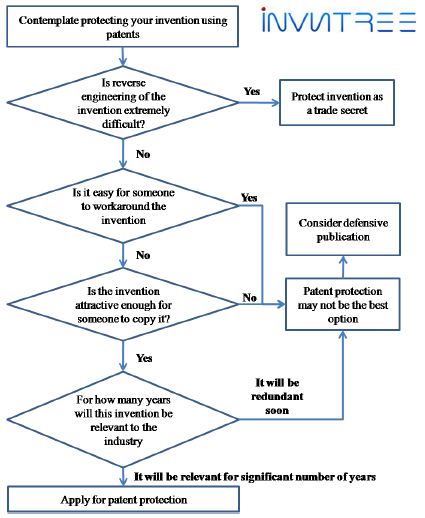Are patents always the best way to protect inventions?
To answer this question, let us first look at the bright side of patent. If you have a patent granted from your invention, it gives you the rights to exclude others from commercializing your patented technology for 20 years in the country in which it is granted. In other words, it means, you enjoy monopoly over the patented technology for 20 years in the country in which it is granted.
This sounds like a great way to protect your invention. However, before drawing such conclusion, let us try to get an idea about the effort involved in getting a patent granted.
- On an average, it takes ~47 months (identified using a sample of 3191 US patents granted in the year 2011) from the date of filing a patent application to get a patent granted. Patenting is a time consuming process.
- Patents are territorial. This means, you will have to file patent applications in each country in which you want to protect your invention.
- You will have to pay a statutory fee to the patent office in each country you file a patent application. Additionally, you will also have to pay the patent consultant who helps you with filing the patent application in the respective country (we once received a quote of $2000 from a Japanese attorney for filing a patent application in Japan). In a nutshell, patenting is an expensive process.
Irrespective of all these hurdles, individuals and companies file for patents. In certain circumstances, it makes perfect sense to protect your inventions using patents. However, in my opinion, you should ask yourself some questions before you decide to protect your invention using patents.
- How easily can my invention be reverse engineered?
- How easy is it for someone to work around the invention and achieve the advantages provided by the invention?
- Is the invention attractive enough for someone to copy it?
- For how many years will this invention be relevant to the industry?
In rare occasions, the nature of invention is such that reverse engineering the same is extremely difficult. In such cases, it is advisable to protect the invention as trade secret. By maintaining your invention as trade secret, you can benefit from it as long as someone reverse engineers it. On the other hand, if you were to protect this type of invention using patents, your protection would be limited to 20 years and to the countries in which you have secured a patent. Additionally, your competitors will get sufficient information from the patent specification, which can be used to work around your invention.
Companies often use patent and trade secret protection wisely together to derive maximum benefit.
How easy is it for someone to work around the invention and achieve the advantages provided by the invention?
One of the main objectives of getting patent protection is to ensure that advantages of your patented technology are not provided by your competitors’ products/processes. However, in some cases, the nature of the invention is such that, one can easily work around your patented invention, irrespective of how well a patent specification is drafted. In such cases, even if you do get a patent for your invention, you may not essentially gain any significant advantage from that patent. When such is the scenario, patenting may not be the best step forward, especially in cases where money is a concern.
However, if you indeed decide against patent protection in the above-discussed scenario, you can consider defensive publication as an option. By adopting defensive publication, you ensure that competitors do not patent obviously-similar technologies and stop you from using such technologies.
Is the invention attractive enough for someone to copy it?
Well this question, in most cases, is extremely hard to answer. However, if the answer to it is a straight NO, then from a commercial point of view, it may not be a good idea to get patent protection. As mentioned earlier, patents give you the rights to exclude others from copying your invention. If nobody is interested in copying your invention, then there are very few reasons to get patent protection. However, as in the previous case, if you decide against patent protection, you may consider defensive publication as an option.
For how many years will this invention be relevant to the industry?
Some industries are such that certain technologies become redundant within an extremely short span of time. Considering the time consuming nature of patenting process, sometimes the technology you are intending to patent becomes redundant even before your patent application is published by the patent office, leave alone granting of patent.
In cases where life span of technology is significantly short, you will have to consider factors such as, the time required to copy your invention by your competitors and potential revenue generation from the patented technology. If your invention is such that, the time required for copying your invention and launching a product based on that technology by your competitors is pretty much equivalent to the life span of that technology, then I see few reasons for patenting. Instead, a defensive publication is a better option.
To conclude, one needs to take an informed decision on protecting business interests, be it through patent protection or otherwise.
I hope you find this article helpful in taking decisions with respect to your inventions. You Can download a complimentary copy of this article here
Please feel free check our patent services page to find out if we can cater to your patent requirements. You can also contact us to explore the option of working together.
Best regards – Team InvnTree

 Follow
Follow




Leave a Reply